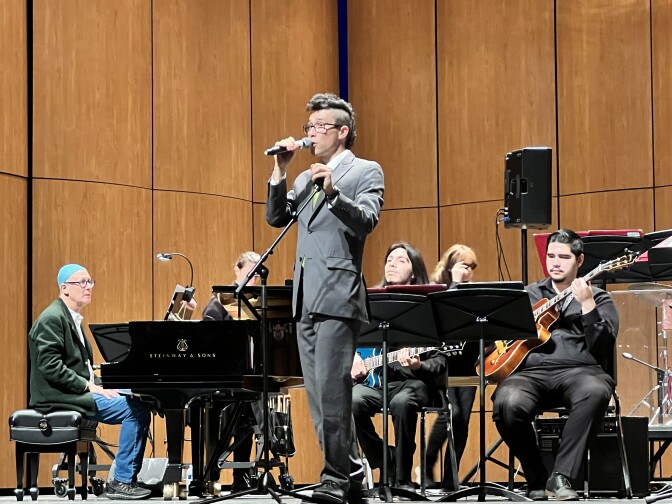This story is free to read because readers choose to support LAist. If you find value in independent local reporting, make a donation to power our newsroom today.
Live Jazz Isn’t Dead, A Pandemic Just Got In The Way

In the newly renovated Long Beach City College auditorium on a recent Thursday night, the audience is far from packed. But those in attendance are nodding in time with the tunes coming from on stage. Faraway looks dot their faces. They wear slight smiles, as though listening to an old friend.
In front of them, about two dozen music students key, strum, and blow high-energy medleys, blushing scarlet as they stand up for their saxophone solos and elbow each other “good job” after each performance.
Leading this jazz band is music professor Patrick Sheng, tonight sporting a Key lime-green tie and a mohawk.
Sheng is the director of instrumental jazz studies at LBCC, and teaches jazz ensemble, jazz combo, jazz theory, jazz improv, jazz history …
“Everything with the word 'jazz' in front of it,” he laughs.
Upcoming Concert
The next Long Beach City College jazz performance:
April 13, 7–10 p.m.
diPiazza
5205 E. Pacific Coast Highway, Long Beach
We stand on the stage after the show, facing out as the audience empties and students greet their parents, scraping tuba cases across the black floor.
Sheng says music programs across the country were hit hard by the COVID-19 pandemic. Since his classes are all performance-based, he found that Zoom just wasn’t working.
“Instead, I gave everyone just basically remote recording projects,” Sheng says. “I would build a click track and this is actually how the recording world works now. So we just did that because like, it's a different skill set.”
Sheng says LBCC’s music program was one of the first to return to in-person instruction and performance, and they’ve been back live for almost two years now, bringing performances to shrinking, yet enthusiastic, local audiences.
“Right now, everyone's talking about how people are disconnected,” Sheng says. “This is one of the easiest ways ever to connect to people.”
Live in concert
There’s nothing at a four-year university that they don’t have at LBCC, Sheng says.

“We have a lot of the same teachers as CSUs and UCs,” Sheng says. “You can pay $46 a unit to study here with the same person that you would study with over there doing the same classes. Or you could pay $500+ a unit going to a CSU or UC.”
Sheng says the live concerts are essential for students, like Kenneth Evangelista, a music major at LBCC who will be moving on to a four-year university for music.
Evangelista plays jazz piano, which is the last instrument lingering on stage when we speak. Grinning, he effortlessly starts improvising a little tune for me.
“Jazz involves a lot of improvisation,” he says, adding a trill of keys over the Steinway.
Evangelista had a small feature in the concert, and says there is something special about performing with his friends, even though the audience wasn’t packed.
“It's just a camaraderie that I feel from the band. It was really fun. I feel really good,” Evangelista says. “I feel very fulfilled.”

Evangelista graduates next year and says his dream is to compose and arrange for a wide variety of jazz groups in his career, and he feels LBCC was the right place for him to start.
“I trusted the music program here,” he says. “There are multiple groups that you can join, jazz band is one of them. Jazz combos, which are small groups, wind ensemble, the orchestras, the vocal groups, but I enjoy jazz band a lot.”
Keeping the dream alive
Eddie Bonilla plays trombone in the jazz band, but majors in classical tuba performance and education. He says he found LBCC when his four-year choice fell through.
If You Refuse To Go Out
We asked LBCC jazz professor Patrick Sheng for his go-to jazz recommendations.
Living:
Legends:
“I was supposed to go to a four-year university and some paperwork issues happened,” Bonilla says. “And two weeks before the semester was about to start, I got called and got told that my admission got revoked. So I was scrambling to find a music program and a friend that I had, I remembered that she was here and studying.”
Bonilla likes that LBCC has students of all ages from different walks of life, and he feels like his professors want him to succeed. “It's the best decision I ever made,” he says.
Bonilla starts at Cal State Fullerton next semester. His goal is to become a studio musician, making scores for movies.

“Pretty much the music that you hear is usually performed by live musicians,” Bonilla explains. “And those are usually like the top musicians, wherever you're based.”
Sheng is hoping to prepare his students for whatever path they take.
“My real hope is that everyone gets to be the best player that they can be before they go,” Sheng says, “Because we're a community college, we're not like an end stop necessarily.”
As for the audience? Sheng hopes to see more people braving the traffic to connect with fellow music lovers in person.
“It's better than watching TV,” Sheng says.
For those who aren't going to local city college concerts, he says: Do it.
"You've got nothing to lose. It's in your neighborhood. They have these rad guest artists from all over the world coming over. You pay for it with your taxes. You might as well come check it out.”







